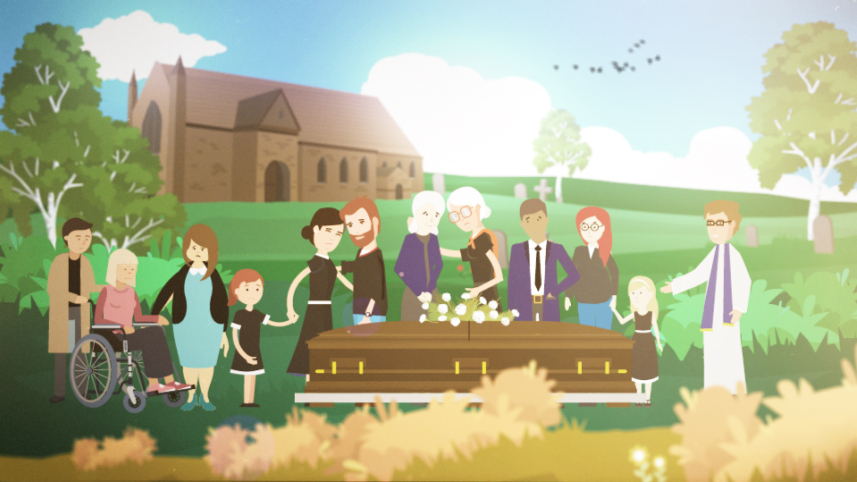
The Catholic Church in England and Wales today publishes a major new online guide to Catholic funerals and cremations on its Art of Dying Well website which was launched to widespread acclaim last year.
The guide comes as a new poll commissioned by the site shows that almost half of UK adults (45 per cent) think that funeral directors should have access to professional counselling.
The new guide - aimed at curious non-Catholics as well as Catholics - sets out the options to anyone who is organising a Catholic funeral, including on the question of burial or cremation, family involvement, music and readings, eulogies, reception of the body and requiem Mass or service of the word.
The Art of Dying Well poll found that more than a third (37 per cent) thinks that funeral directors must struggle with the constant theme of death and grief and 39 per cent of those surveyed believe that they face more sadness than many other professions.
Meanwhile, just over 1 in 5 UK adults (21 per cent) assume that funeral directors often don't have access to professional support if they have had a bad day at work.
The Church said: 'Funeral directors and all those involved in the funeral industry have it tough. Day in day out, the role involves dealing with a lot of sadness, grief and loss. They also have to deal with very traumatic events - deaths through major incidents; the death of a child, violent deaths, murder, suicide, death due to the fault of others - from carelessness or negligence, terrorism, deaths in all kinds of horrific circumstances.
'Often, they don't have anyone to talk to when it all gets too much or if they have had a very bad day. It can be pure chance whether a funeral director has access to professional counselling; some do, some don't.'
Paul Allcock, Director of Allcock Family Funeral Services in Norwich added: 'Often funeral directors are the forgotten ones. We deal with the most difficult situations and scenarios on a daily basis. We are dealing with everyone else's grief. We are not immune to grief ourselves and distress at some of the situations that we come across. I'm lucky that I've got a lot of family around me and we know when one of us is having a bad day. Not every funeral director in the country is in the same situation.'
The survey is released on the Feast Day of St Joseph of Arimathea today, the wealthy nobleman who buried Christ's body in his own tomb after the Crucifixion. He is the Patron Saint of Funeral Directors, Undertakers and Morticians.
About St Joseph of Arimathea, Paul Allcock said: 'I have every intention of making sure that all my fellow funeral directors across the country are made aware of the help that is at hand for them through the intercession of this saint. We need all the support that we can get.'

Adrian Forsey of Forsey and Son Funeral Directors, Glastonbury said: 'I feel that we often devalue our own concerns when comparing them to the sometimes tragic losses of the bereaved family and feel guilty or selfish about seeking help. Vulnerability can especially arise within many small funeral directing companies of only one or two staff members who may not belong to professional organisations where support is available.'
Speaking about the new guide published by the Catholic Church in England and Wales, Fr Tim Menezes of the Archdiocese of Birmingham said: 'A good funeral is one where everyone feels welcome. It requires time spent with the family and listening to them. It needs careful preparation and planning. The local parish priest should be able to help you at this difficult time. The Catholic funeral well prepared and rooted in the Scriptures can be a real source of strength to the family in their grieving and in the natural questions that arise.'
Kathryn Turner, head of the Department of Spirituality in the Diocese of Hexham and Newcastle added: 'The personal touch is so important. You can help so much by being there and listening. At a very bleak time for a family, we can be there for them and accompany them on that journey, from when someone has a diagnosis of terminal illness to their death and for as long as it takes afterwards.'
Packed with resources and personal testimony and input from professionals and experts in palliative care, ethics, chaplaincy and history, 'The Art of Dying Well' is a modern update to the popular fifteenth Century Catholic text Ars Moriendi, or Art of Dying.
Based on the Catholic Church's rich tradition but open to all, the site features real-life stories about the highs and lows of dealing with the final journey.
The site deals with everything from the importance of communicating about dying from the point of views of the dying, loved ones and carers, to what dying is actually like to the spiritual dimension of death and dying.
The original Ars Moriendi manuscript was designed to bring Christian comfort and practical guidance to a dying person and his or her family. The Latin texts and illustrations offered advice on the protocols and procedures of a good death, including deathbed etiquette and prayers, as well as the five temptations that a dying person might face and the prescribed antidotes. It illustrated turbulent scenes, such as the devil trying to snare the soul of a dying man and battles raging between the angels and the demons at the deathbed.









